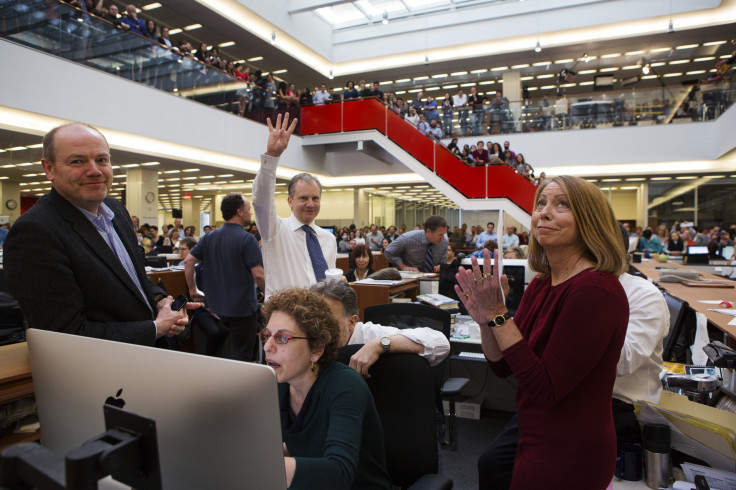Read Full Arthur Sulzberger Jr. Statement Defending His Decision To Fire Jill Abramson From The New York Times

Arthur Sulzberger Jr. released a statement on Saturday defending his seemingly sudden decision to oust Jill Abramson from her esteemed position as executive editor of the New York Times. In the statement, Sulzberger said replacing Abramson with former Times managing editor Dean Baquet had nothing to do with gender.
He said “the saddest outcome” of his decision was “that it has been cast by many as an example of the unequal treatment of women in the workplace.” Sulzberger was referring to rumors that the real reason for Abramson's ouster was sexism. He countered allegations that Abramson was paid less than her predecessor, noting that in her last year as executive editor she was paid more than her predecessor, although that might be the case simply when adjusted for inflation.
Sulzberger stood his ground and stuck with his original assertion, that Abramson was unfit to lead the newsroom.
“Jill is an outstanding journalist and editor, but with great regret, I concluded that her management of the newsroom was simply not working out,” he wrote.
According to his statement, Sulzberger heard too many complaints about Abramson from colleagues and warned her that she’d be out if she didn’t fix the issues. He claims her firing had nothing to do with her gender.
Sulzberger’s statement is already taking a lot of heat on Twitter, with some commenters going so far as to compare him to Iraq's Information minister.
Sulzberger is currently reading his press statement live before cameras http://t.co/oqkyyoscno pic.twitter.com/9mGsgAabEL
— Popehat (@Popehat) May 17, 2014The Sulzberger statement is just tin-eared from start to finish. The saddest part of firing her is that people said mean things? Really?
— Popehat (@Popehat) May 17, 2014Does Sulzberger not understand the magnitude of his firing of Abramson? How is he so obtuse?
— Mona Eltahawy (@monaeltahawy) May 17, 2014The last graph of the Sulzberger statement is so infuriating. I don't know a woman who doesn't want to be treated equally. Condescending.
— Zerlina Maxwell (@ZerlinaMaxwell) May 17, 2014BREAKING: New Sulzberger statement: "And I would have gotten away with it too if it weren't for you meddling women"
— John Podhoretz (@jpodhoretz) May 17, 2014Read the entire statement below:
"Perhaps the saddest outcome of my decision to replace Jill Abramson as executive editor of The New York Times is that it has been cast by many as an example of the unequal treatment of women in the workplace. Rather than accepting that this was a situation involving a specific individual who, as we all do, has strengths and weaknesses, a shallow and factually incorrect storyline has emerged.
"Fueling this have been persistent but incorrect reports that Jill’s compensation package was not comparable with her predecessor’s. This is untrue. Jill’s pay package was comparable with Bill Keller’s; in fact, by her last full year as executive editor, it was more than 10% higher than his.
"Equal pay for women is an important issue in our country -- one that The New York Times often covers. But it doesn’t help to advance the goal of pay equality to cite the case of a female executive whose compensation was not in fact unequal.
"I decided that Jill could no longer remain as executive editor for reasons having nothing to do with pay or gender. As publisher, my paramount duty is to ensure the continued quality and success of The New York Times. Jill is an outstanding journalist and editor, but with great regret, I concluded that her management of the newsroom was simply not working out.
"During her tenure, I heard repeatedly from her newsroom colleagues, women and men, about a series of issues, including arbitrary decision-making, a failure to consult and bring colleagues with her, inadequate communication and the public mistreatment of colleagues. I discussed these issues with Jill herself several times and warned her that, unless they were addressed, she risked losing the trust of both masthead and newsroom. She acknowledged that there were issues and agreed to try to overcome them. We all wanted her to succeed. It became clear, however, that the gap was too big to bridge and ultimately I concluded that she had lost the support of her masthead colleagues and could not win it back.
"Since my announcement on Wednesday I have had many opportunities to talk to and hear reactions from my colleagues in the newsroom. While surprised by the timing, they understood the decision and the reasons I had to make it.
"We are very proud of our record of gender equality at The New York Times. Many of our key leaders -- both in the newsroom and on the business side -- are women. So too are many of our rising stars. They do not look for special treatment, but expect to be treated with the same respect as their male colleagues. For that reason they want to be judged fairly and objectively on their performance. That is what happened in the case of Jill.
"Equality is at the core of our beliefs at The Times. It will always be."
Given all the attention Abramson's firing has gained across the country and online, this particular issue doesn't seem like it's going to be put to bed anytime soon.
© Copyright IBTimes 2024. All rights reserved.












